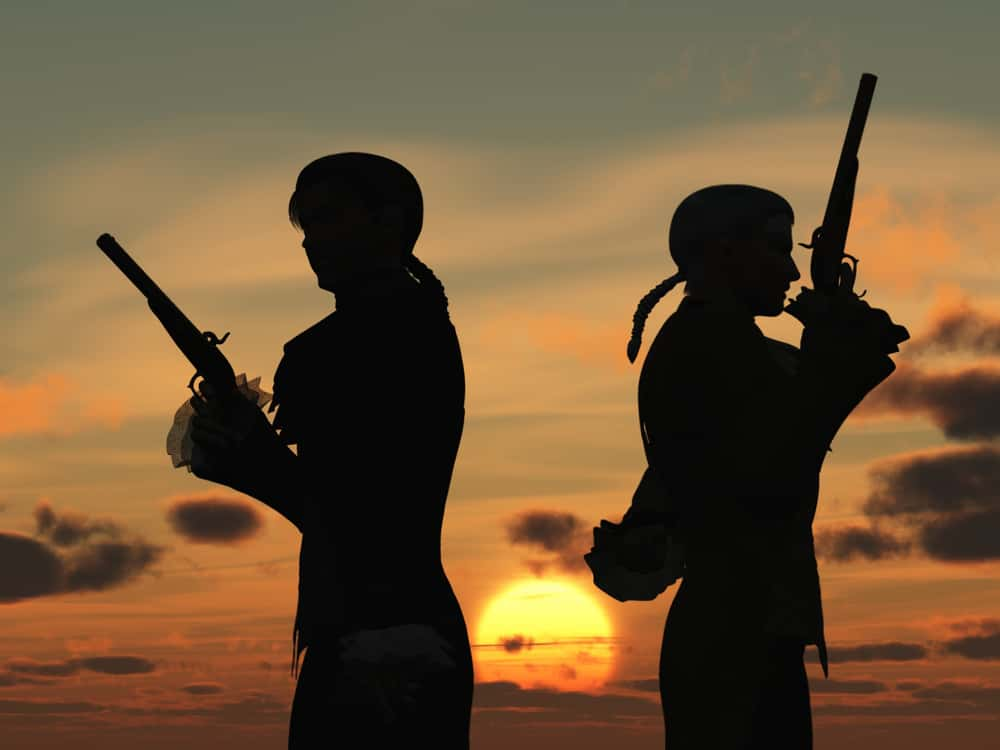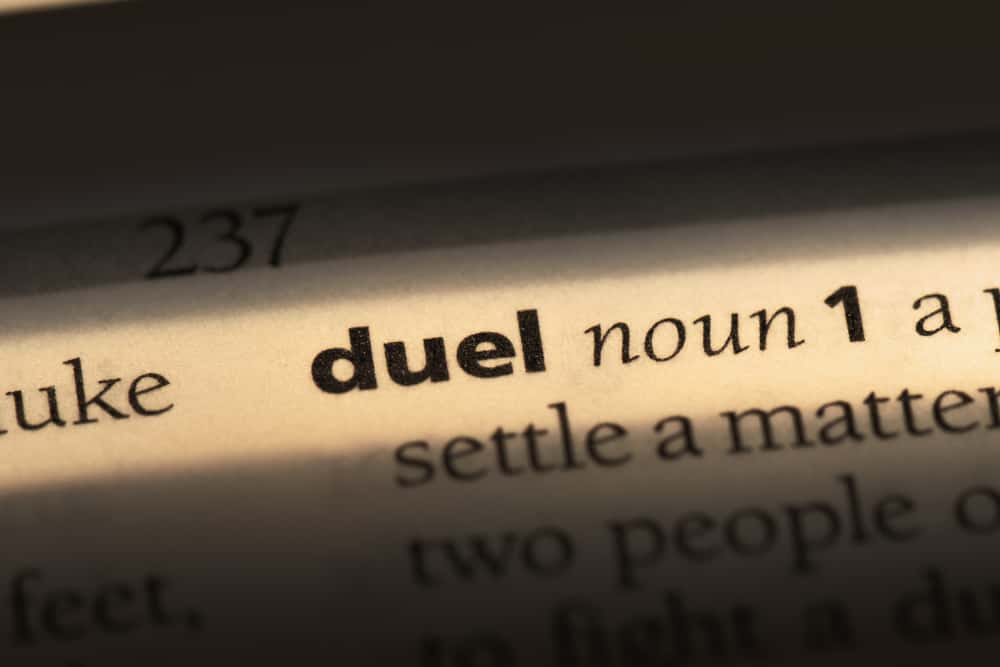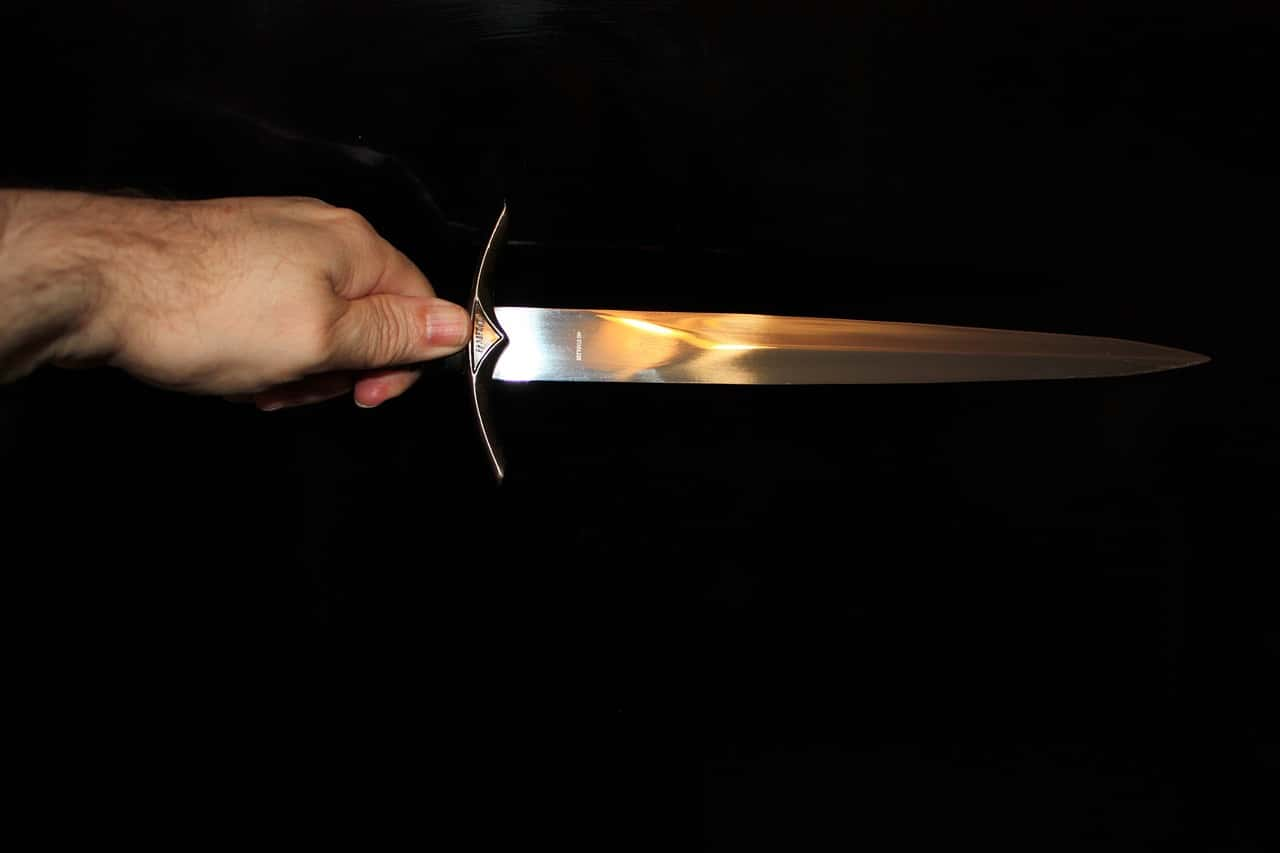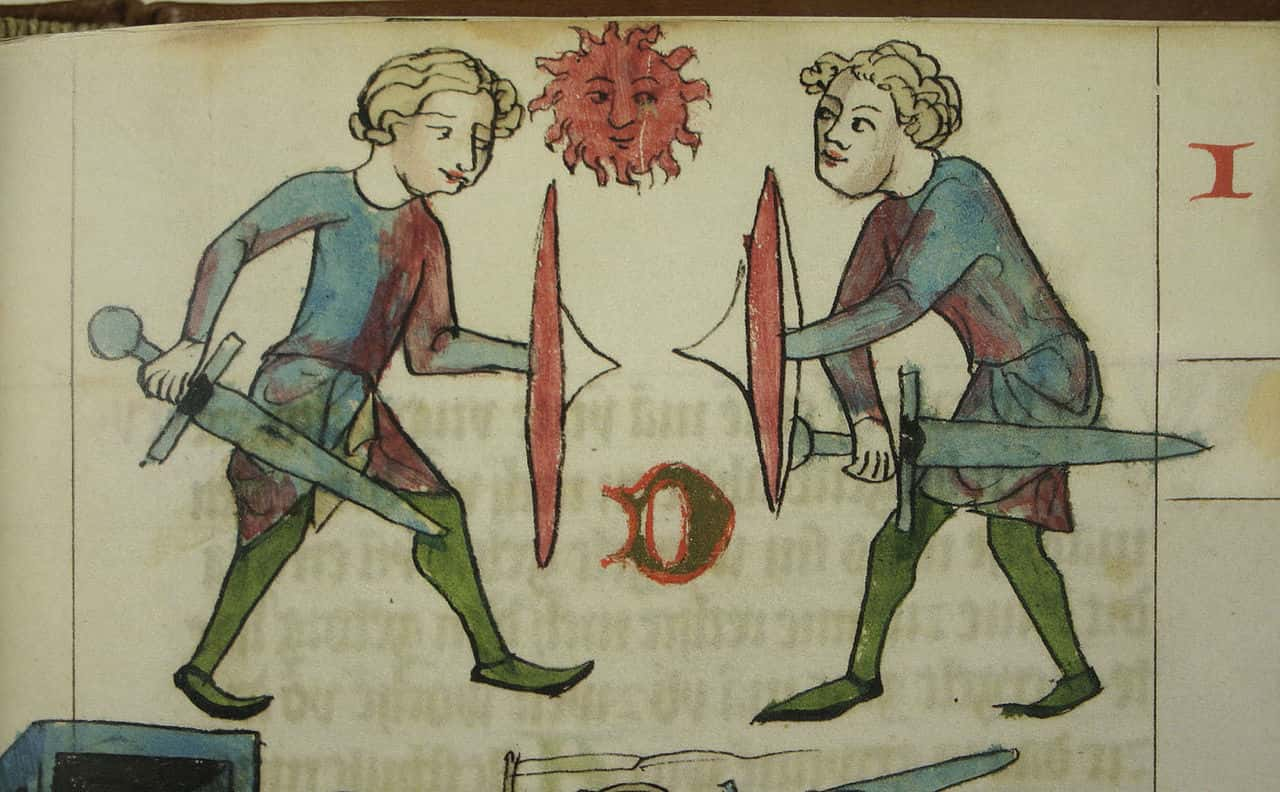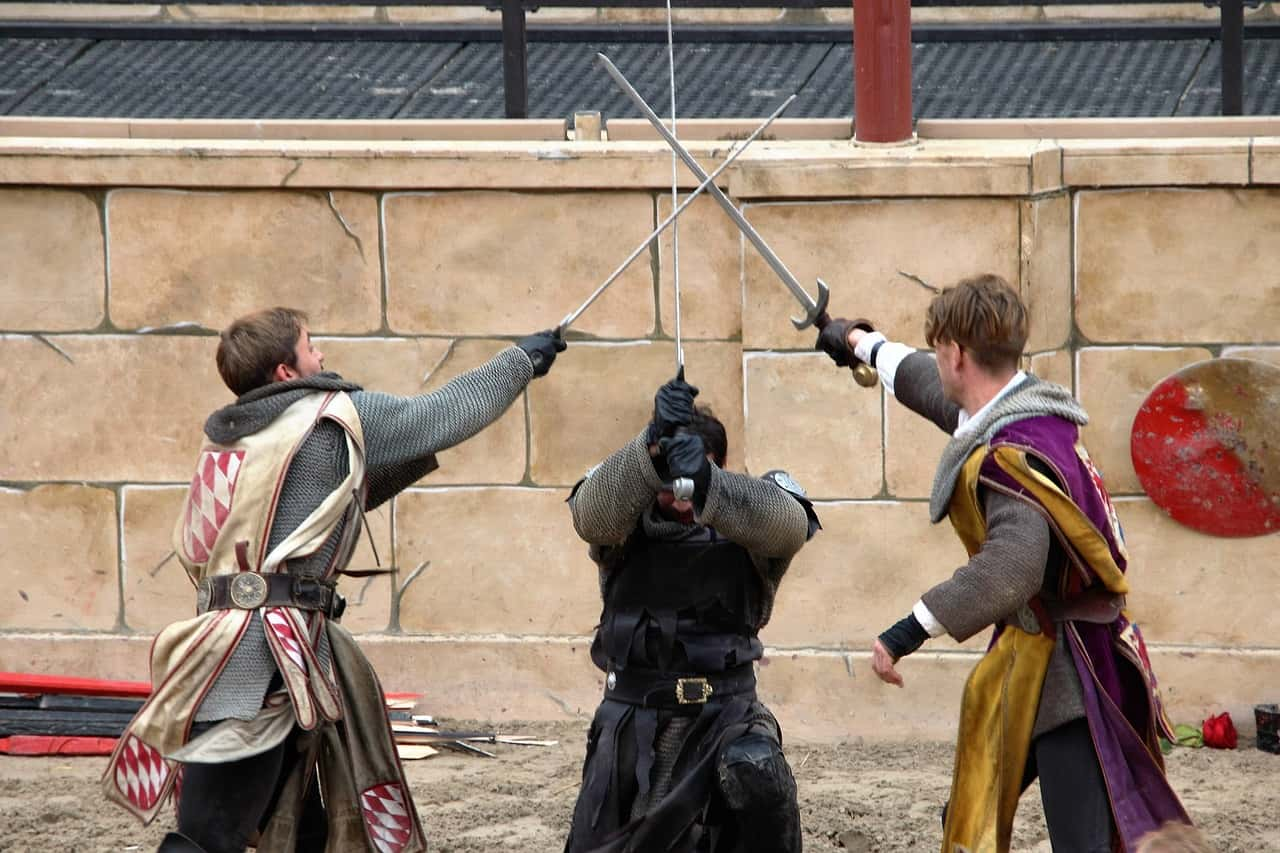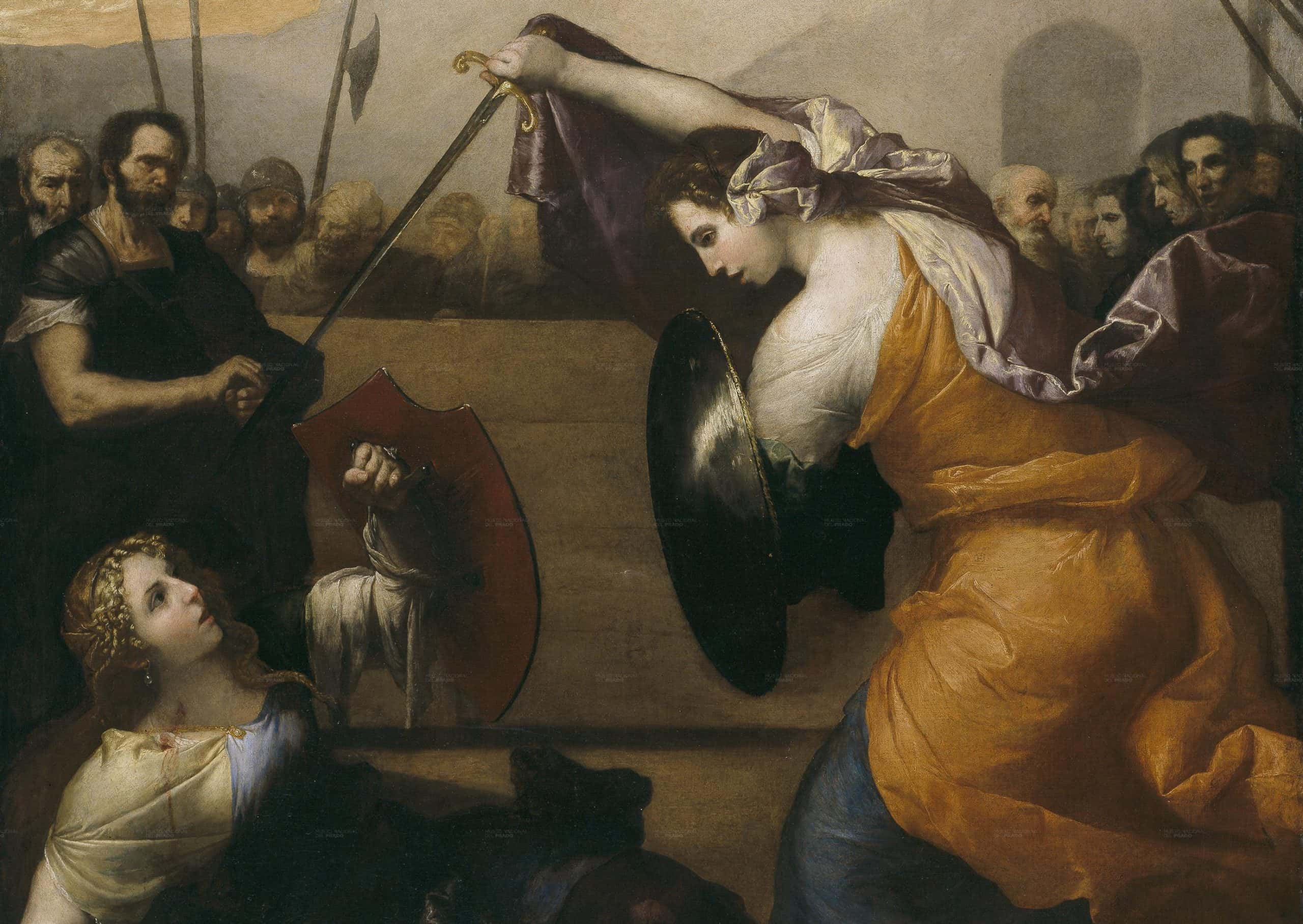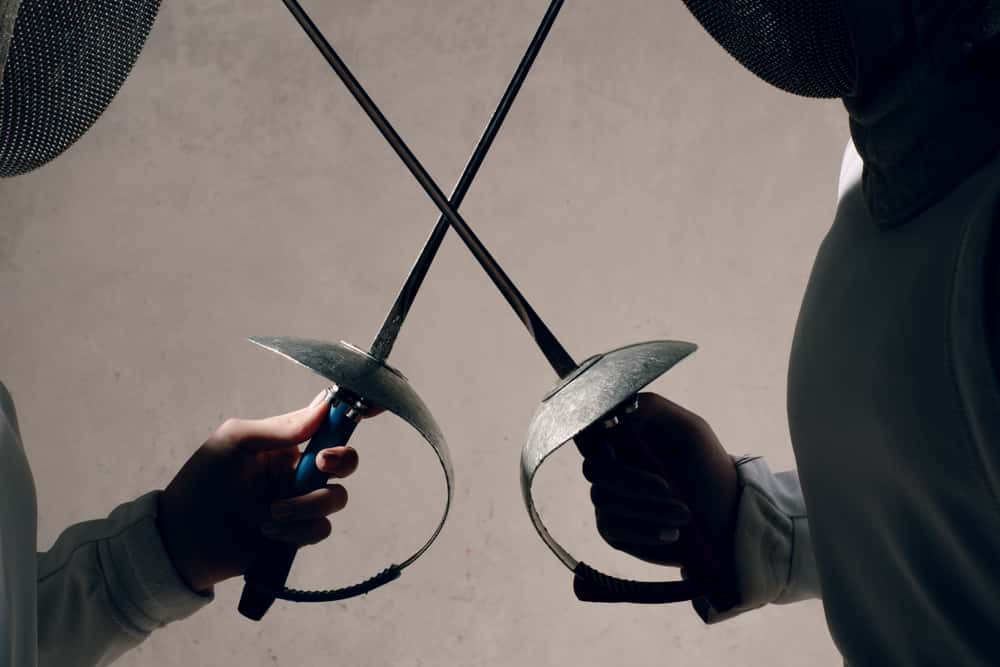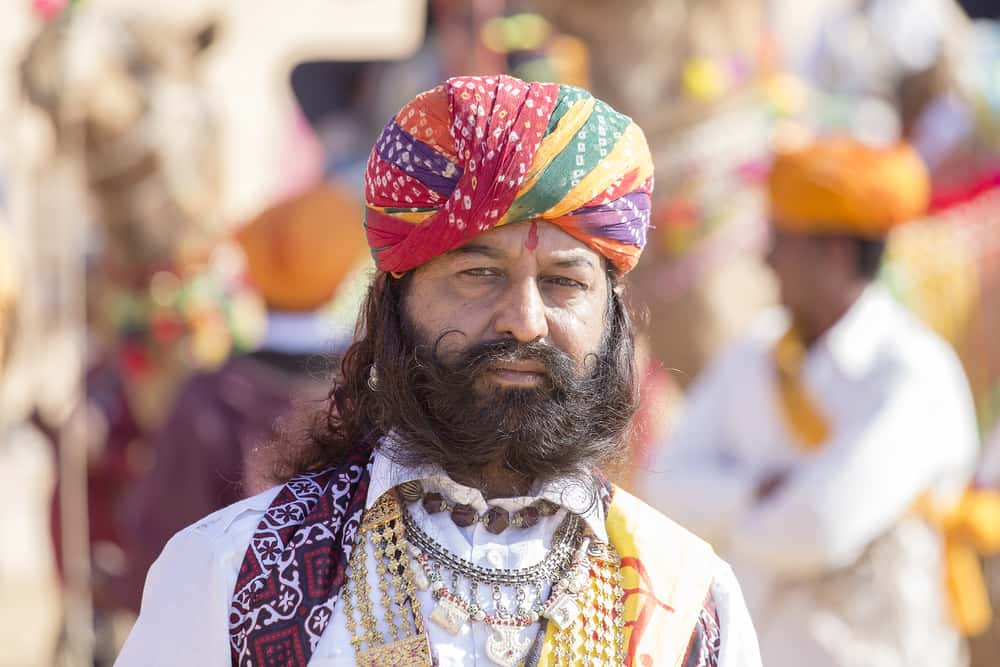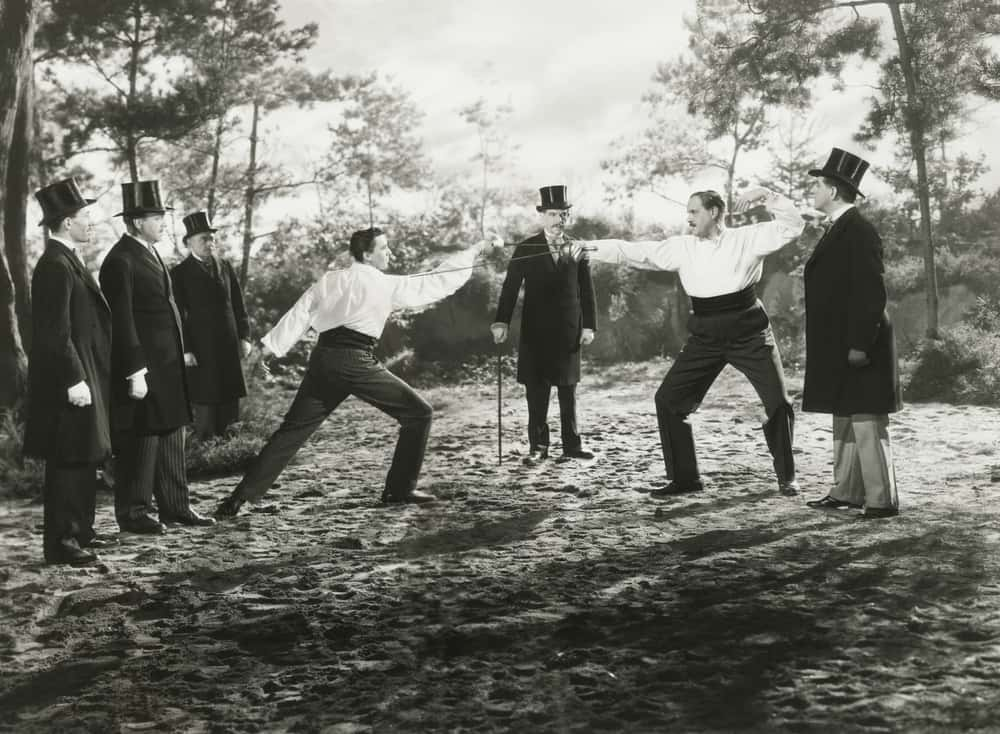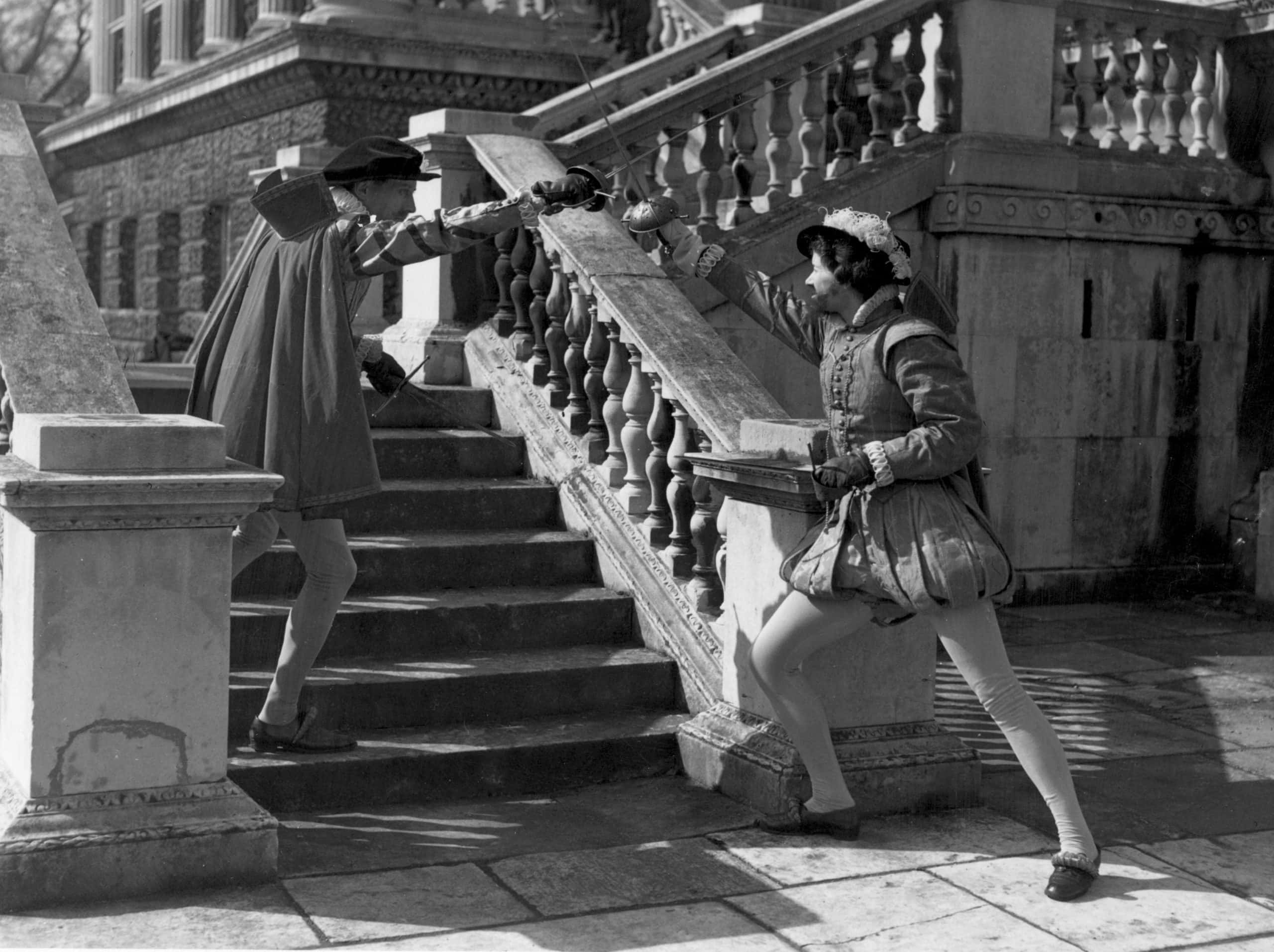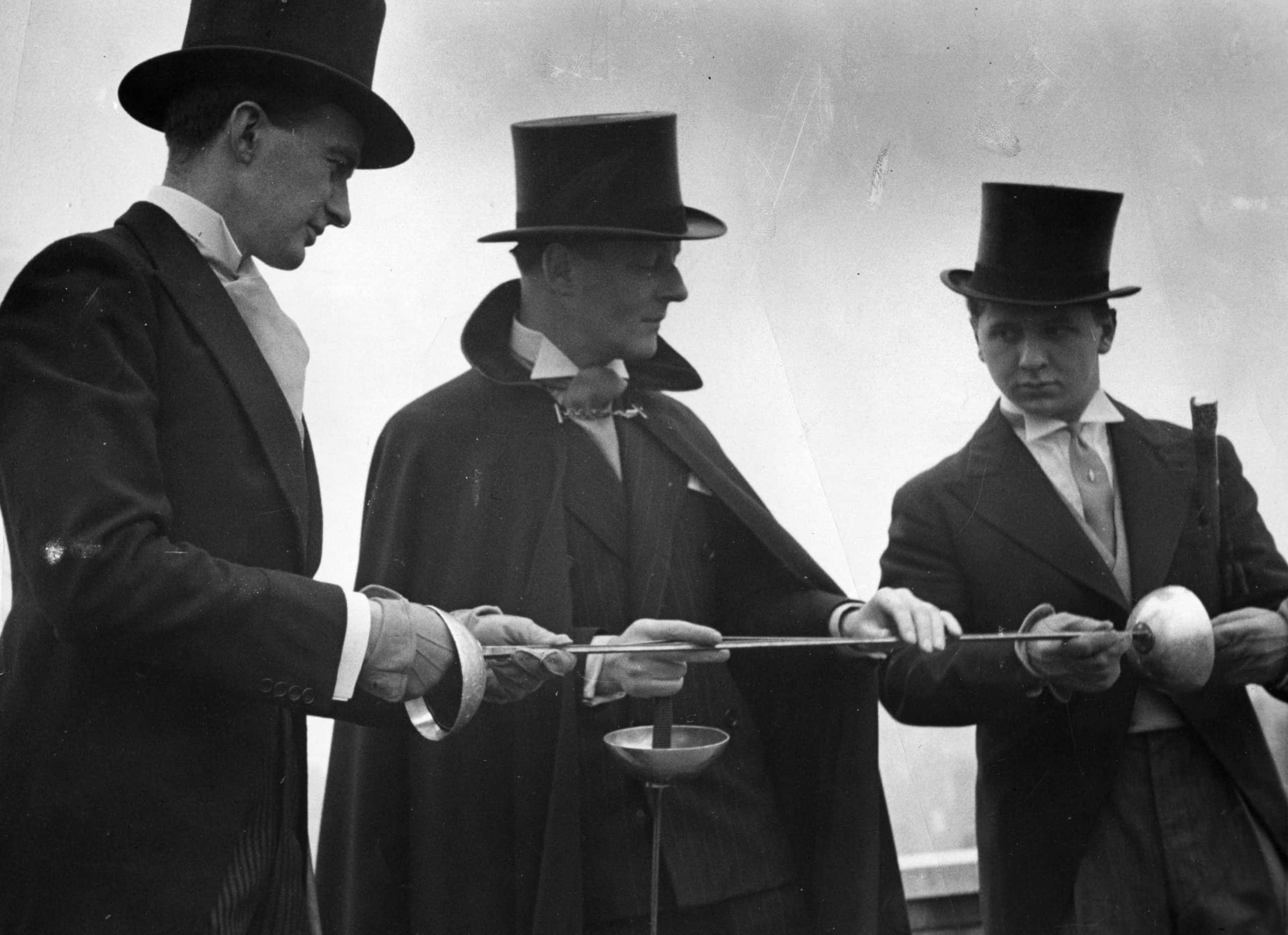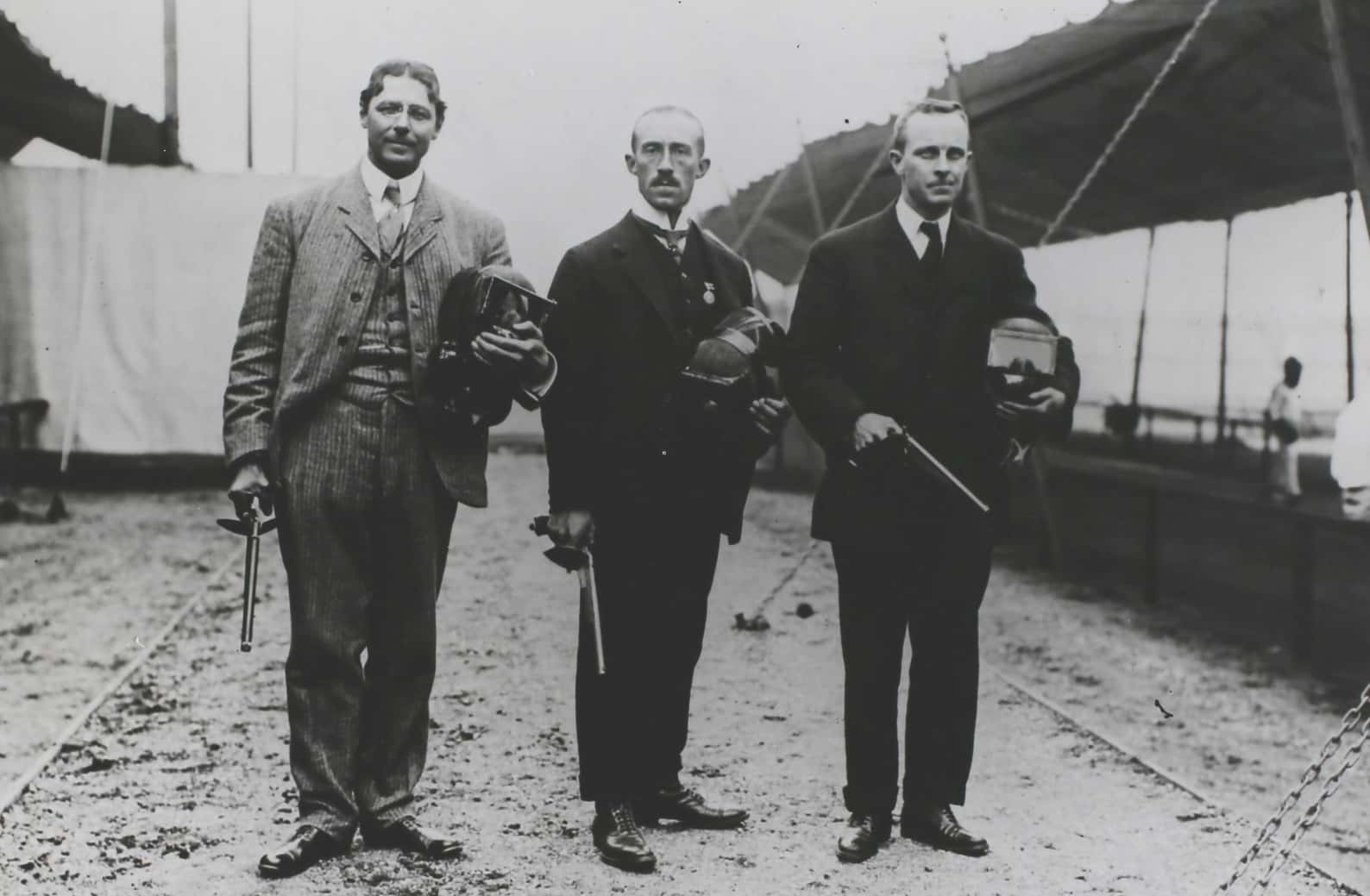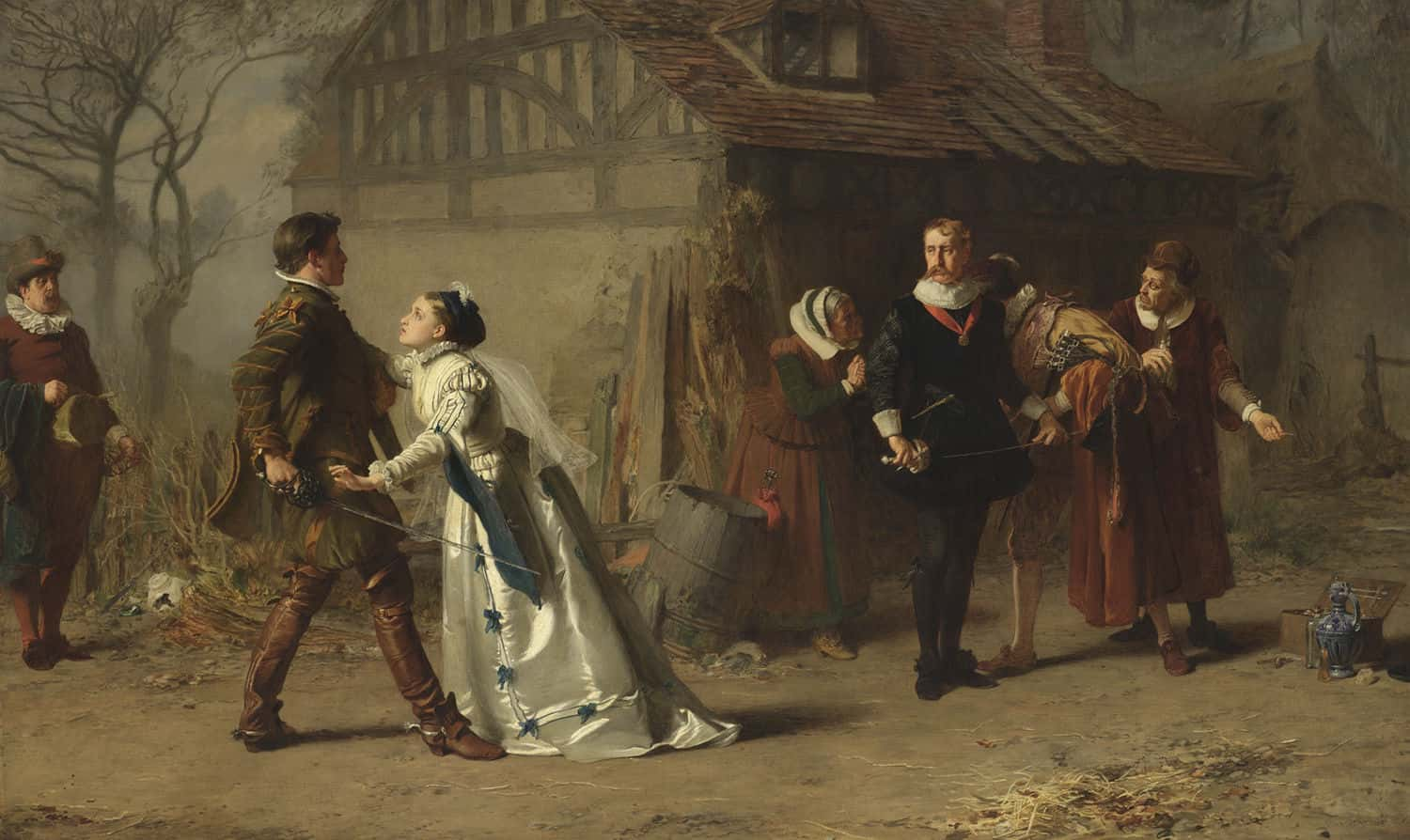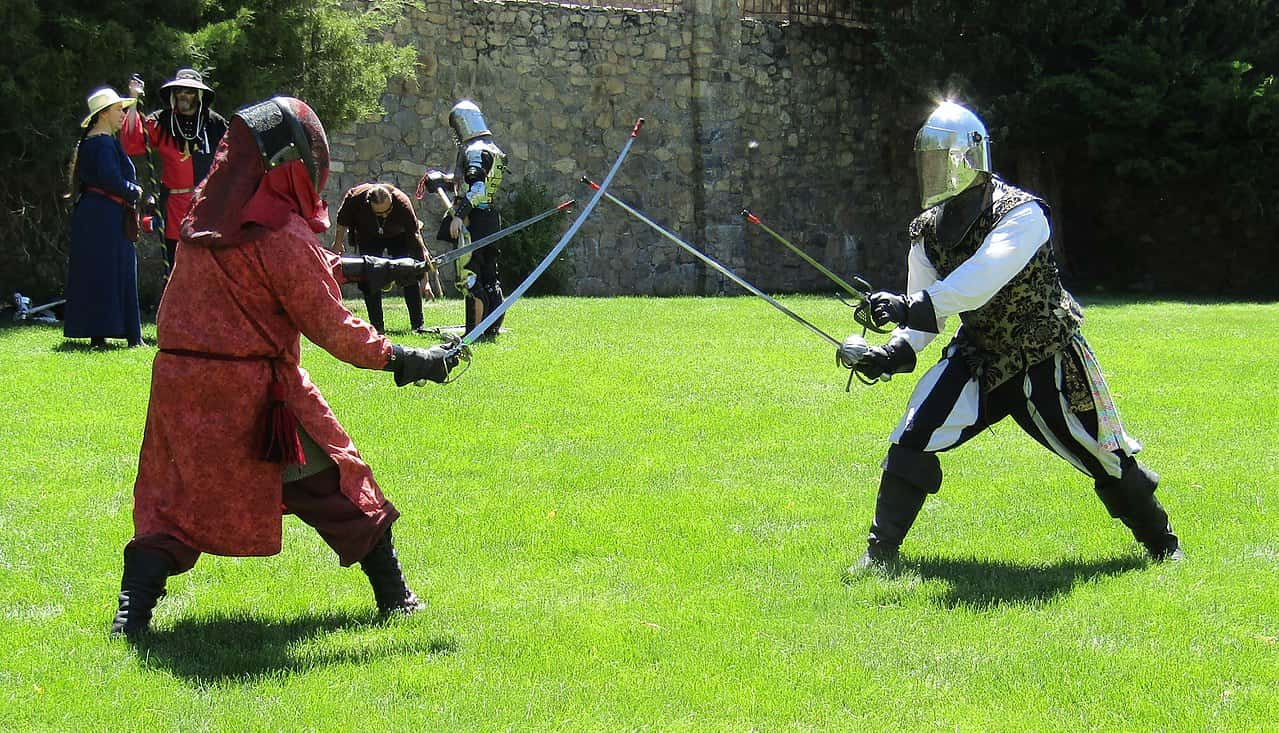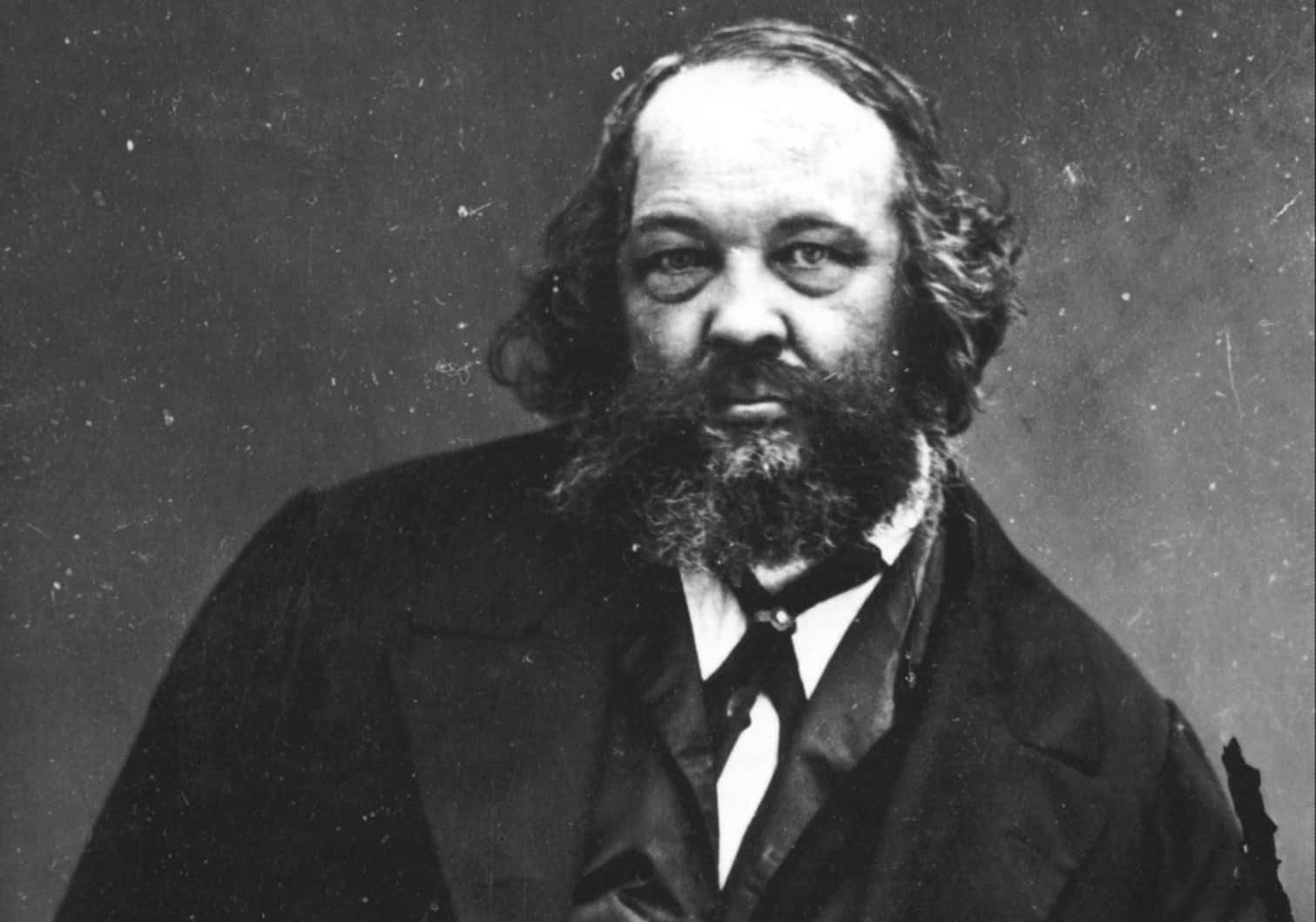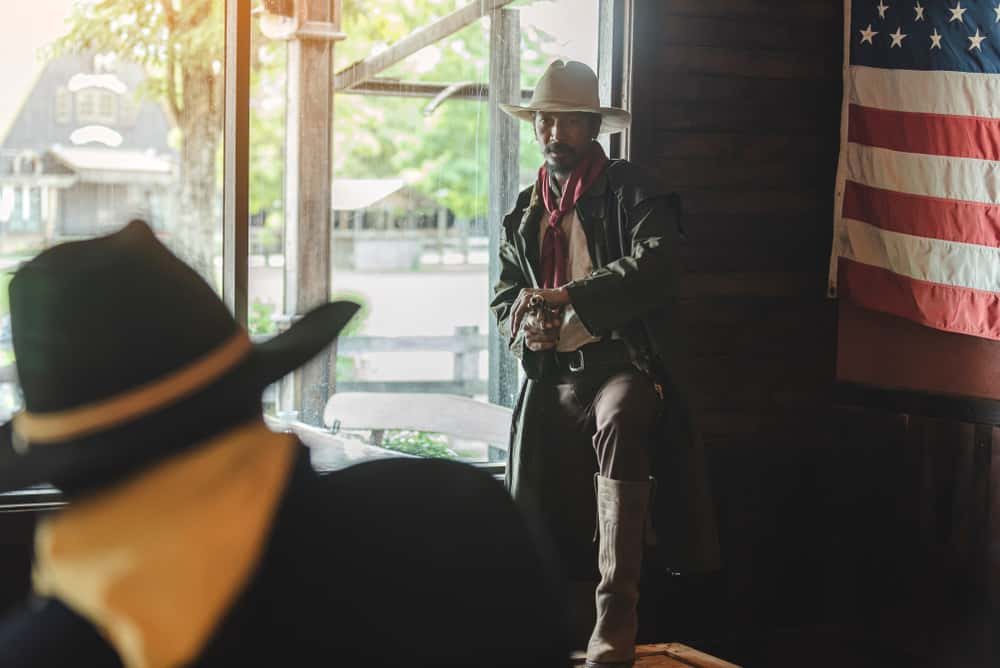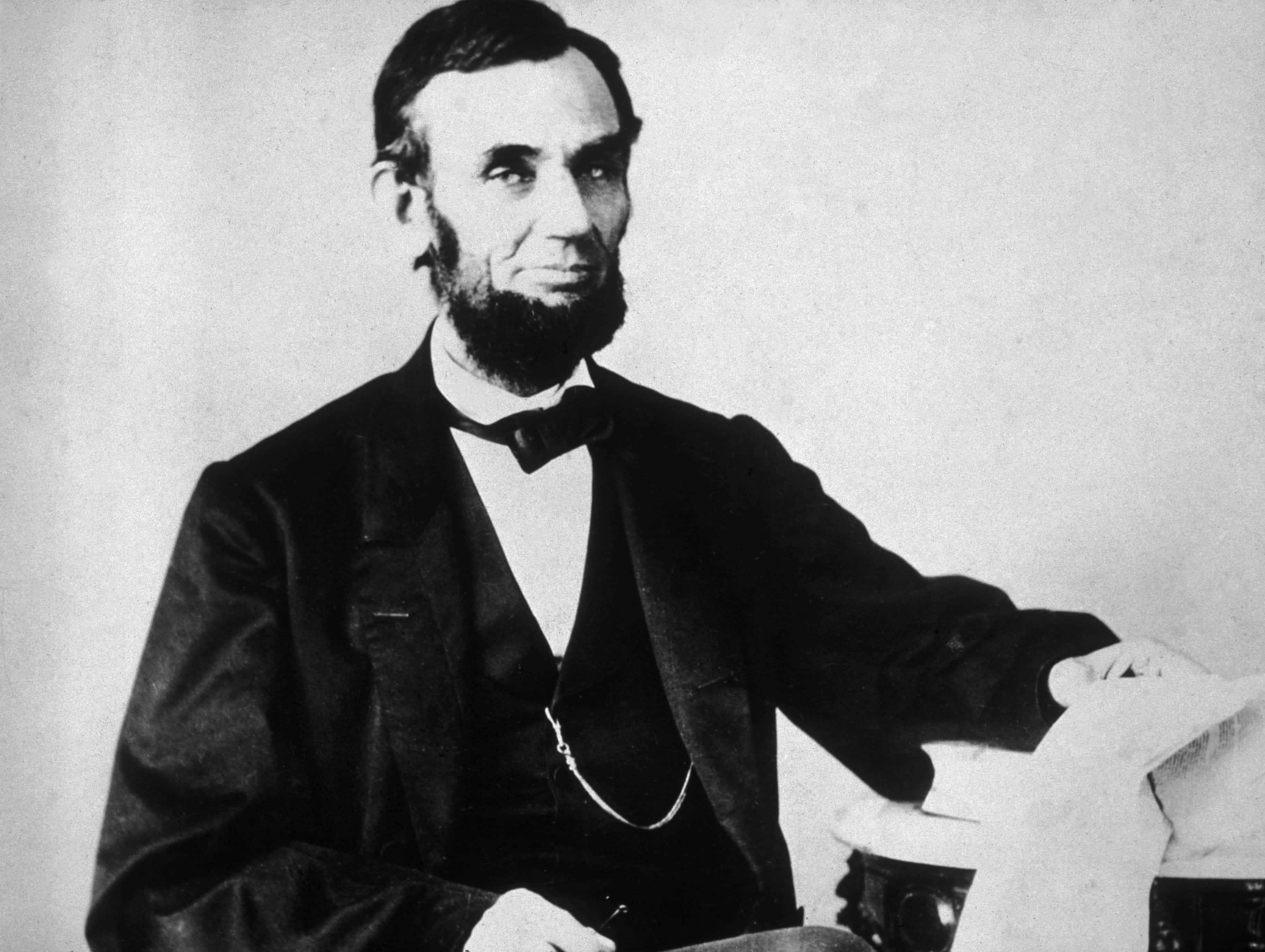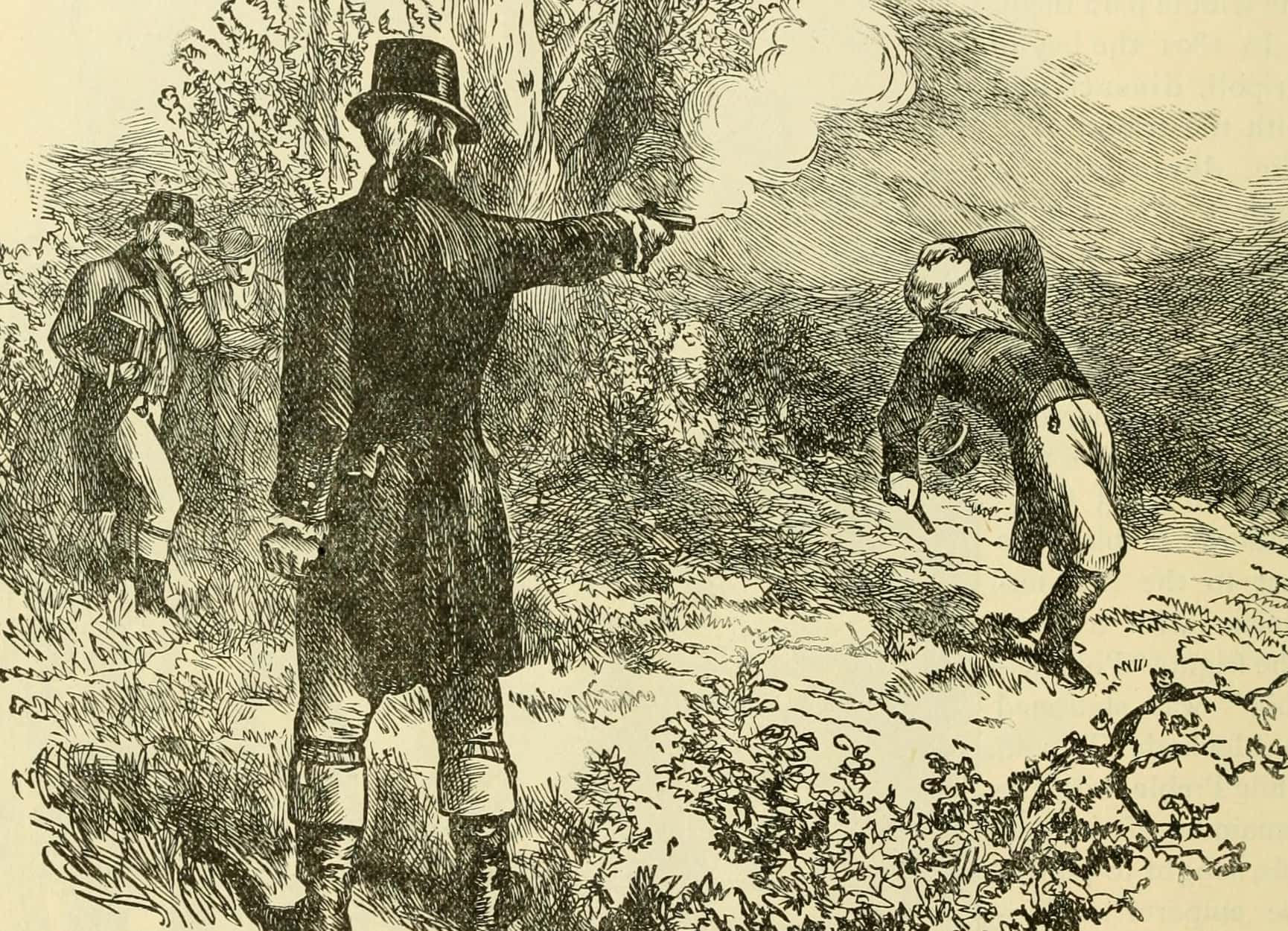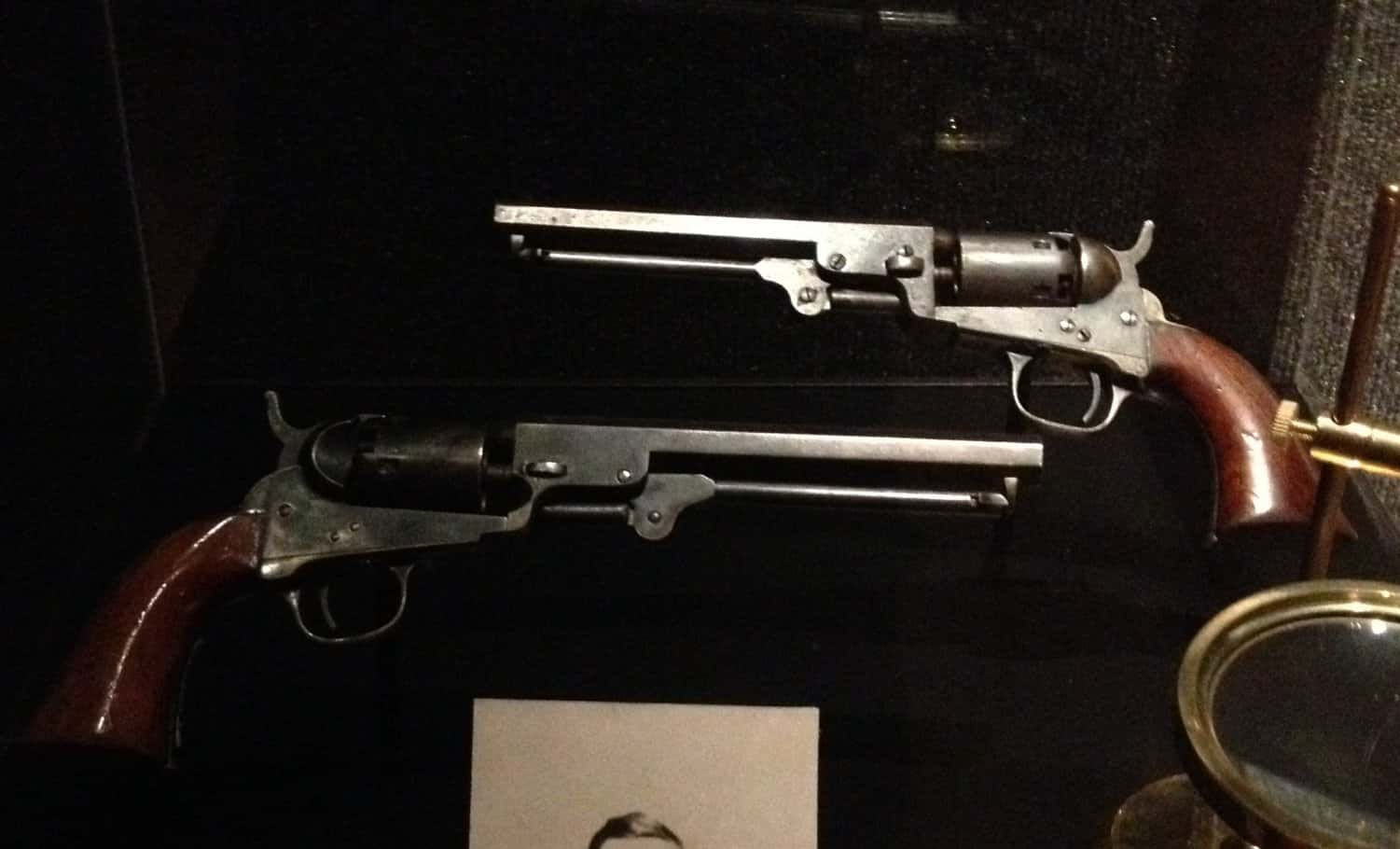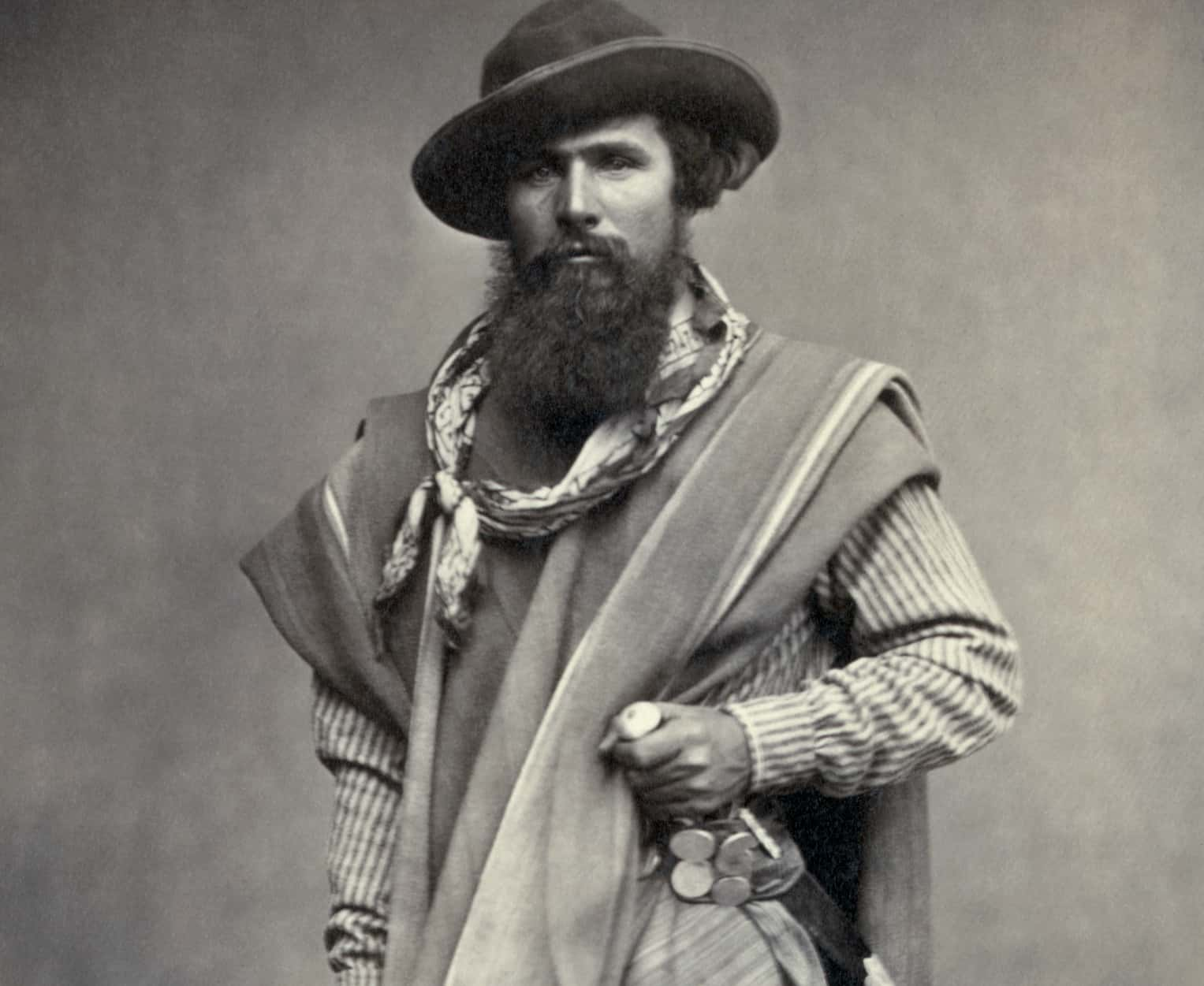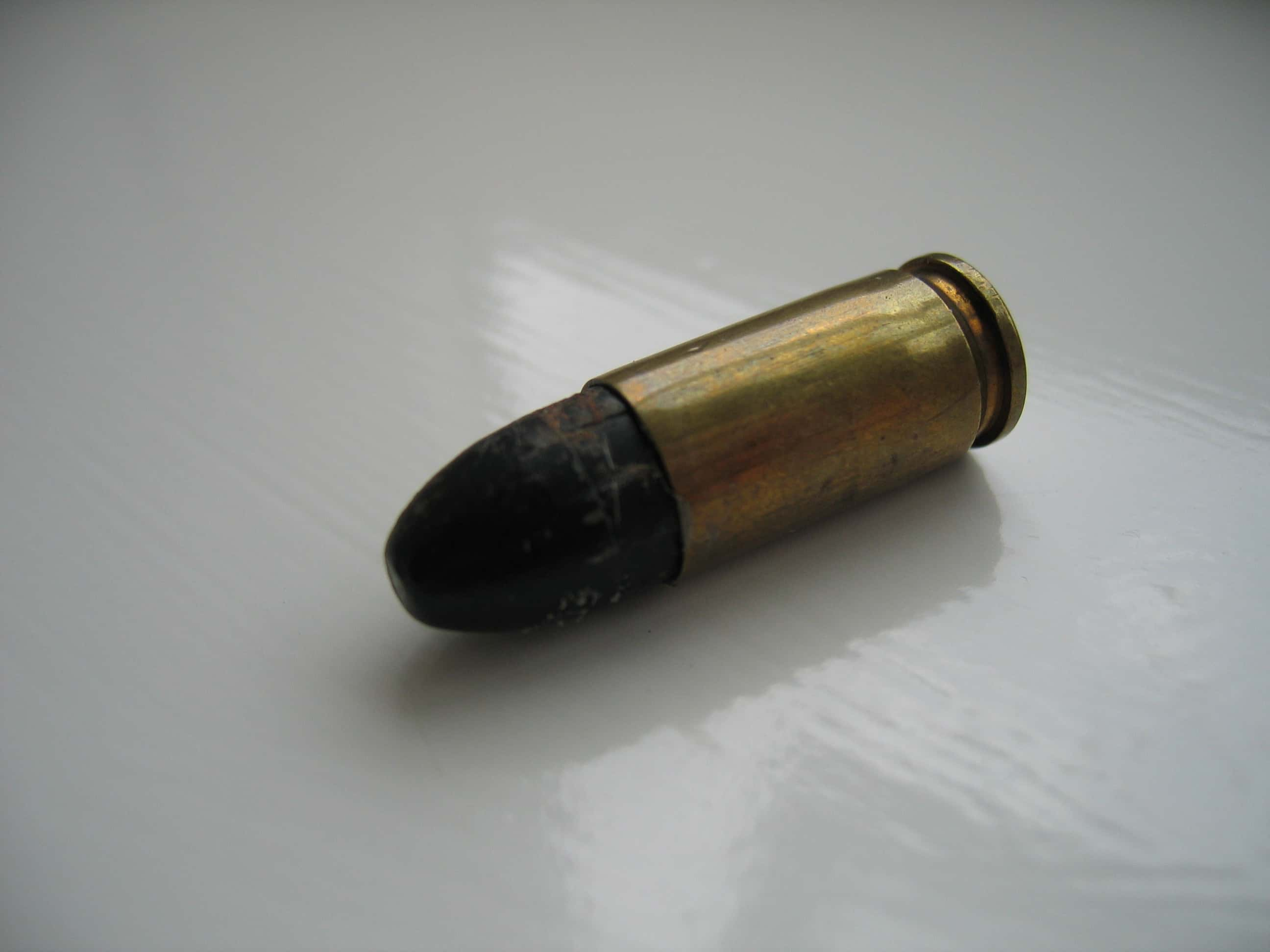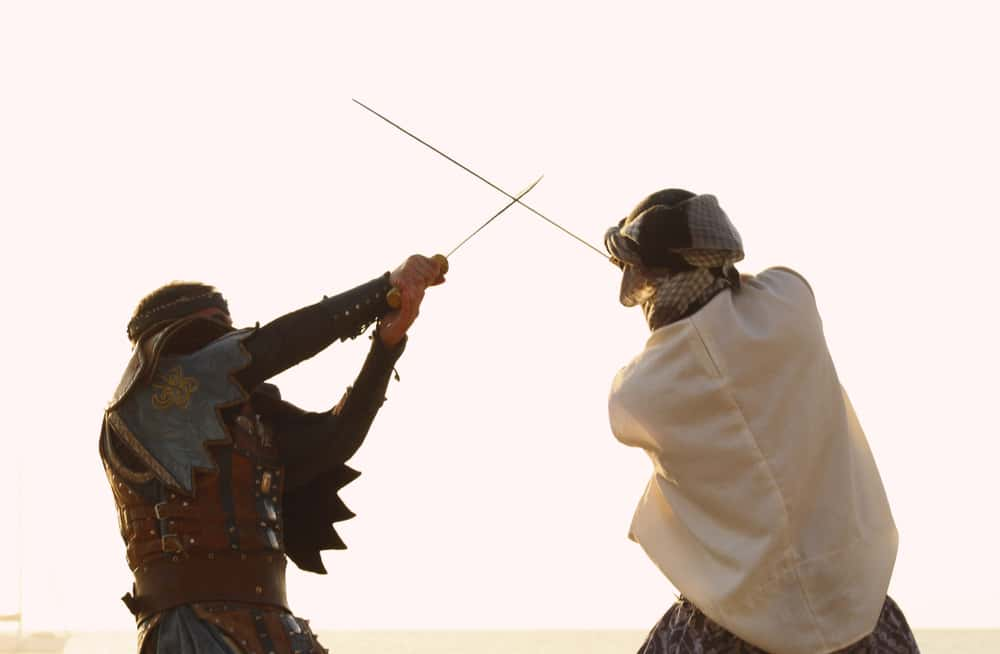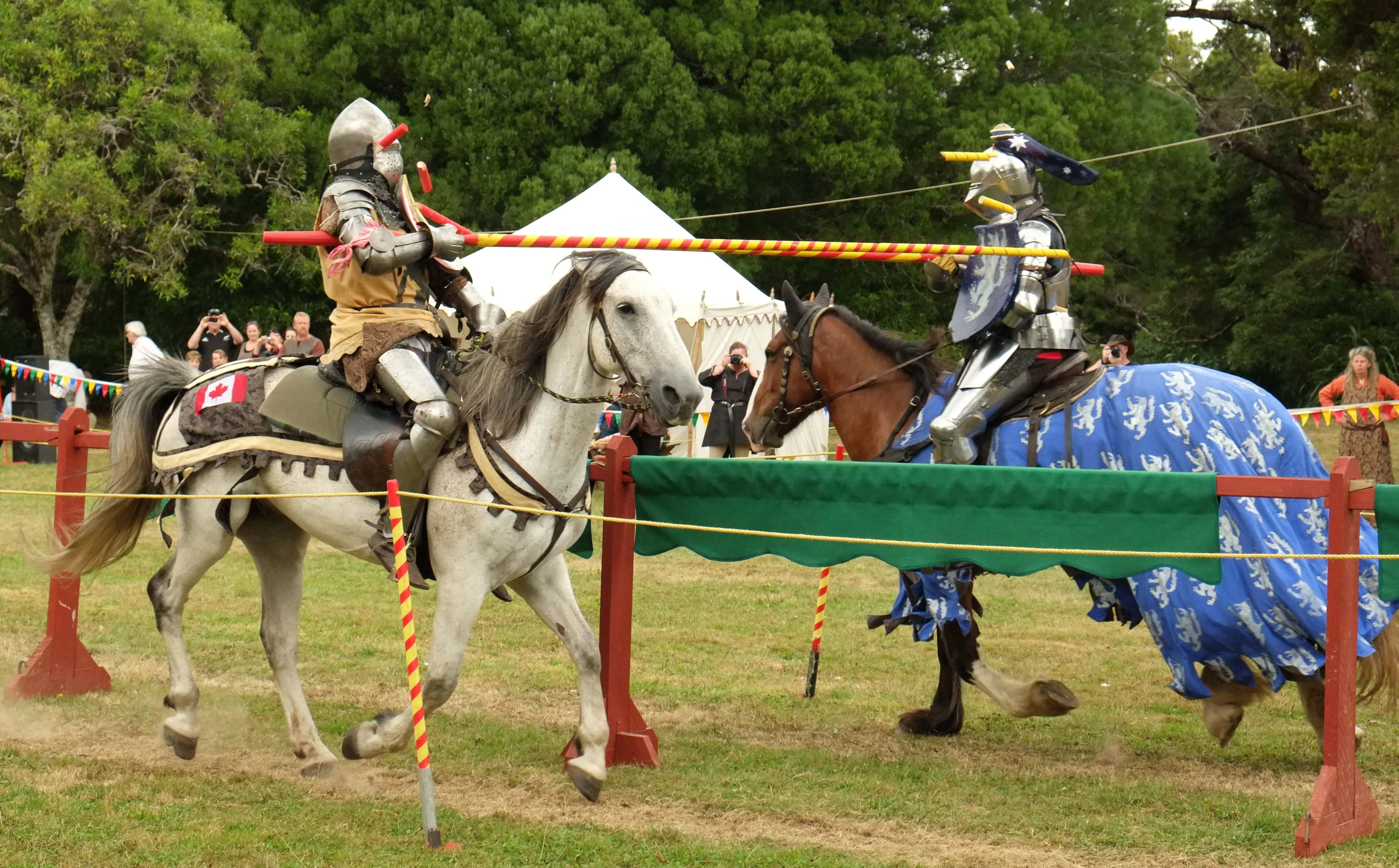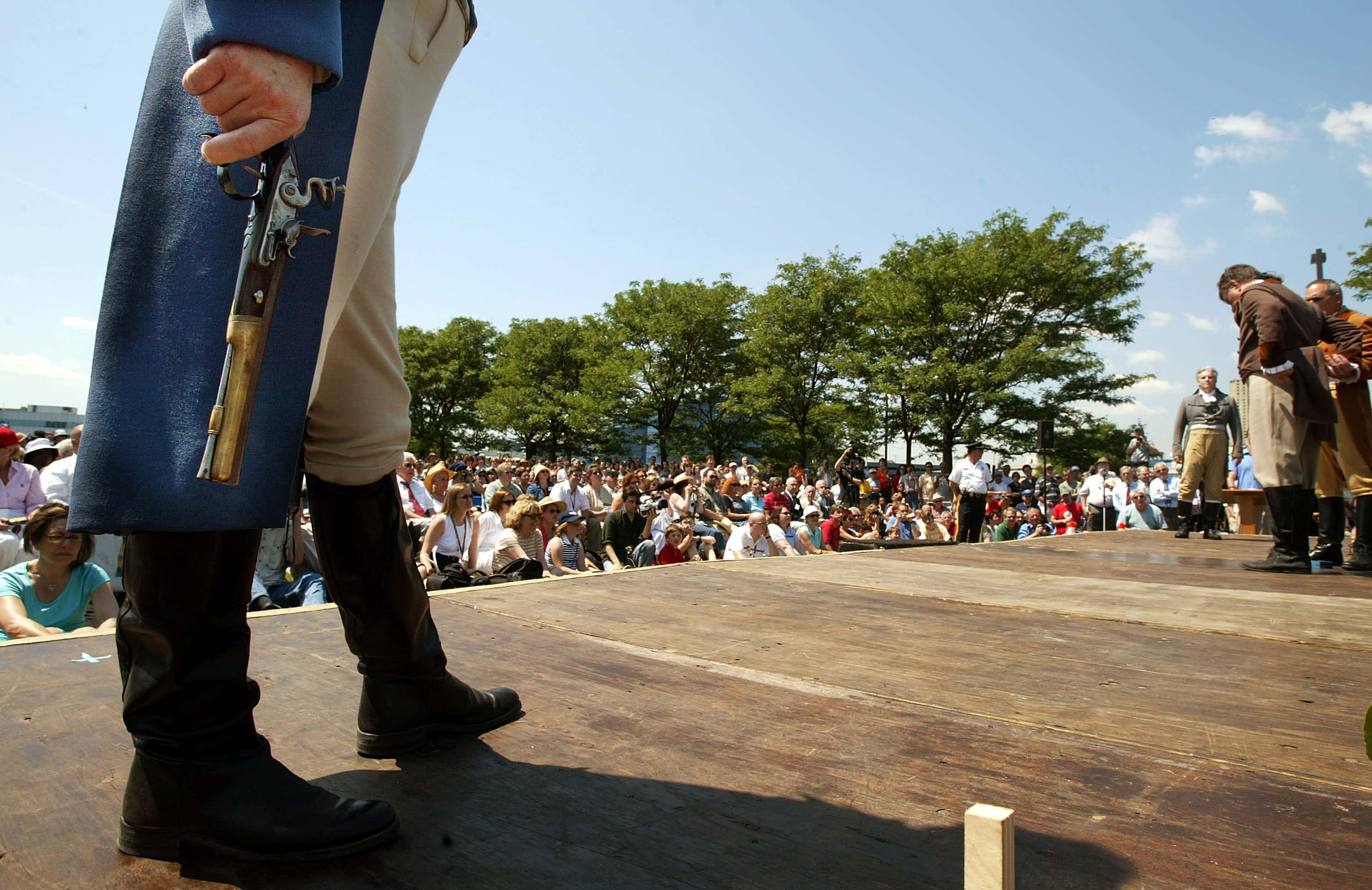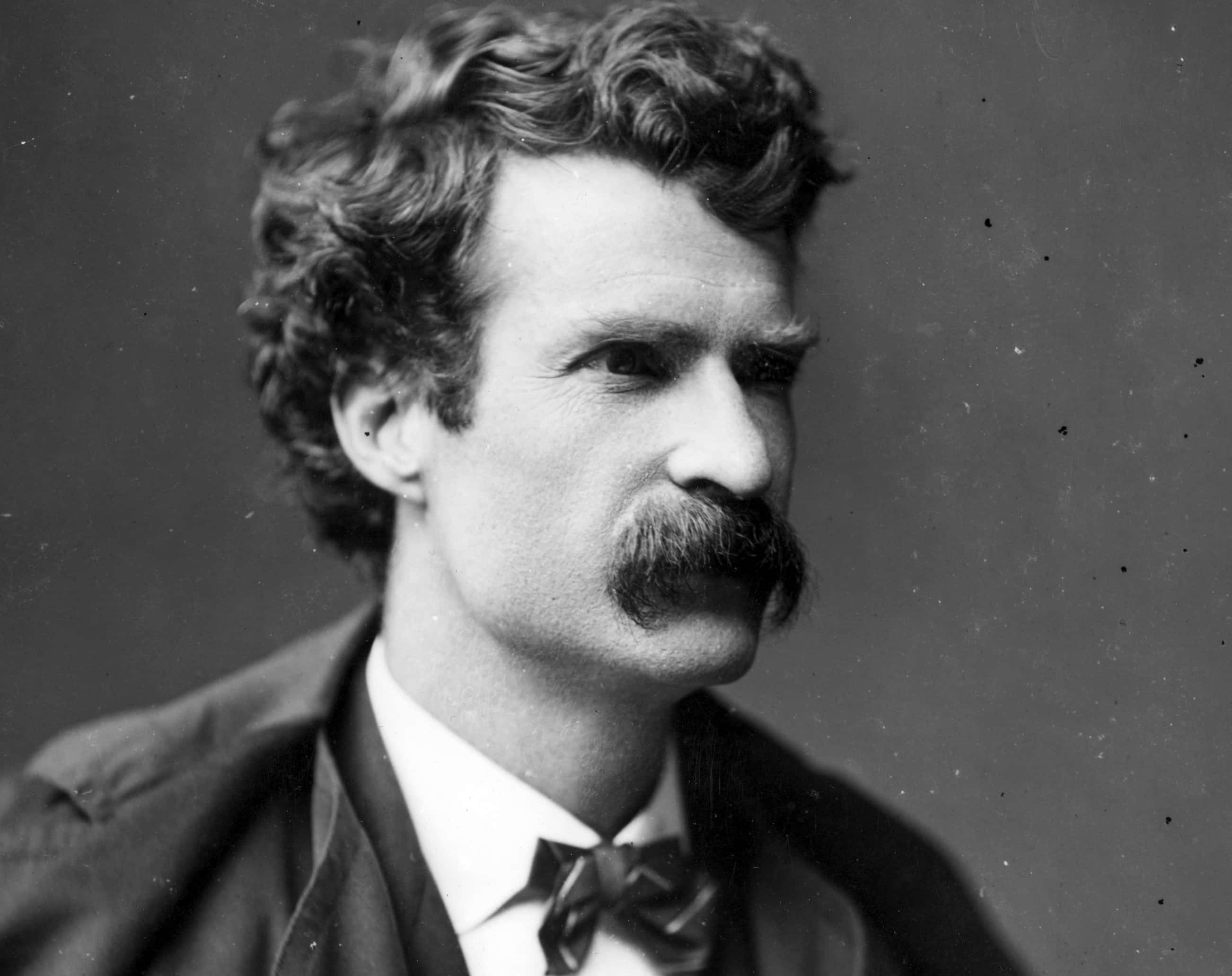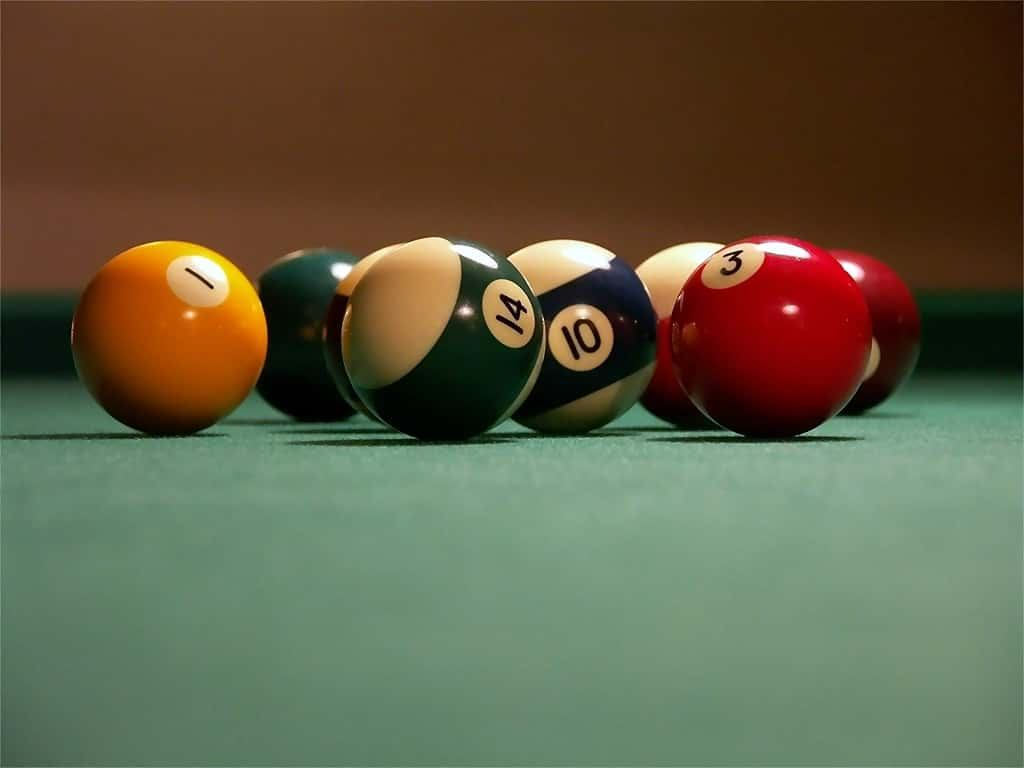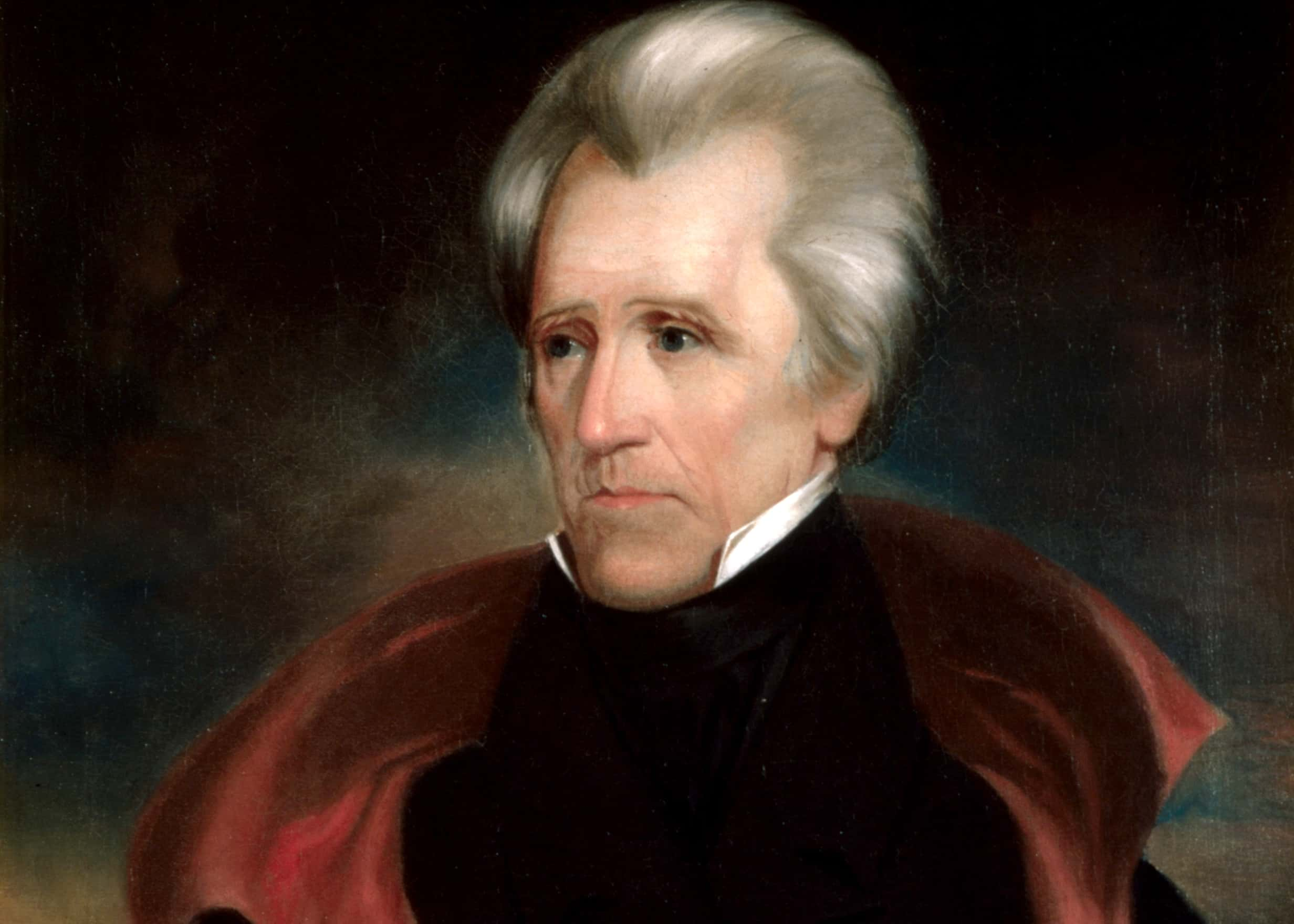"You insulted my honor! I demand satisfaction! I challenge you to a duel!"—Homer Simpson
Throughout the centuries, duels have been fought for all kinds of reasons, in all kinds of ways, with all kinds of results. Today, many people look back on the ritual with a morbid fascination, so here are 43 facts about this drastic and deadly conflict resolution tool to help sate your curiosity.
Duelling Facts
43. To the Death?
Surprisingly, duels were not usually begun with the intention of murder. All over the world, main focus of duelling was generally gaining "satisfaction" for insulted honor. The idea was that one’s honor was worth risking your life to avenge.
42. Deadly Fields
Because duelling was frequently forbidden throughout history (though that depended where and when), duels were often fought on a “field of honor,” which was usually a completely isolated area, to avoid witnesses. In the West, they were usually fought at dawn for the same reason.
41. Someone Find the Dictionary!
Fittingly enough, the word "duel" comes from the Latin word duellum, which is derived from the same word as bellum, which means "war."
40. Cut His Face To Spit in… His Face
In the 19th century, the Ionian islands of Greece saw a tradition of duelling where the goal wasn't actually to kill the other person. First, sexually charged insults would be thrown at each other, and soon a knife fight would break out. The first man to slash the other guy’s face and draw blood was the winner, and this earned him the right to spit on his beaten opponent or wipe his handkerchief in his opponent’s blood. It was considered well worth the obligatory arrests and the slaps on the wrist by the local authorities.
39. Do You See the Light?
Because many duels were fought at dawn, swordsmen were often forced to carry lanterns so they could see each other while fighting. This was apparently such a common situation that fencing classes incorporated lanterns into their lessons. Swordsmen were even taught how to use tricks with the lanterns to win against their opponents.
38. A Viking Date
In ancient Scandinavian culture, a duel was known as holmgang. Traditionally, if a man insulted another, they would meet later for a battle either to death or incapacitation. Because it was a duel, neither could be charged with murder in the aftermath. In Norway, the winner of the duel could claim all of the loser's possessions—add insult to injury why dontcha?
37. Order in the Court! Now Duke it Out!
In old germanic laws there existed a form of legal duelling known as trial by combat. The ruling would depend on whether the prosecutor or defendant was able to kill the other in a battle. Variations of trial by combat existed in England, Italy, France, and even carried over to United States legislation.
36. Choose Your Weapon
Duels have been fought with all kinds of weapons throughout history. The two most traditional weapons (at least in Europe and North America) were the pistol and the sword. According to several duelling traditions, the person who was challenged to a duel was allowed to choose what kind of weapons would be used.
35. Girls Just Wanna Have Fun
In a famous 16th century incident, Isabella de Carazi and Diambra de Petinella got into a duel over a shared lover. The image of two women fighting a duel was enough to get its own painting by Jusepe de Ribera called “Women Gladiators.”

Sign up to our newsletter.
History’s most fascinating stories and darkest secrets, delivered to your inbox daily. Making distraction rewarding since 2017.
34. Forgive Me, Father, For I Have Duelled.
Throughout the ages, a known enemy of duels was the Roman Catholic Church. They disapproved of men killing each other, given that it violated one of the Ten Commandments. They frequently pushed to have duelling made illegal, with mixed results.
33. En Garde, Garcon!
In 1386, Sir Jean de Carrouges accused a squire, Jacques Le Gris, of raping his wife. As the trial dragged on, it was decided that only trial by combat could truly decide the outcome. In a duel witnessed by the royal court and thousands of ordinary citizens, Carrouges claimed a bloody victory by stabbing his dagger into Le Gris’s throat.
32. Forgot His Spectacles
By 1829, the Duke of Wellington had been influential in defeating Emperor Napoleon Bonaparte in Europe, so it’s hard to think anyone would mess with him. But when the Duke supported Catholic Emancipation in Great Britain, the Earl of Winchilsea insulted him for going against the British tradition of despising Catholics. Wellington wasted no time in challenging Winchilsea to a duel, and they met on Battersea fields. When Wellington aimed his gun, however, he fired widely to the right. He claimed that he deliberately missed, though some say that his poor eyesight caused him to miss. Regardless, Winchilsea chose not to fire and wrote the Iron Duke an apology.
31. Too Close for Comfort
When a Colonel Barbier-Dufair and a Captain de Vere couldn’t get over their dispute, they agreed to a very unorthodox method of duelling. They sat in a carriage with their left hands tied together and stabbed at each other with knives as the carriage was driven twice around Place-du-Carrousel in Paris. Predictably, both men were grievously wounded, though Barbier-Dufair survived. No word on how awkward a ride that must have been for whoever was driving the carriage.
30. Assisting the Senior Citizen
In ancient India, it was considered a disgraceful thing to die in bed, so an old warrior in those days could arrange for a pity duel that allowed him to die with his boots on. This practice was called yuddha-dhan, which translates literally to “combat charity.”
29. If Only...
Benito Mussolini himself once participated in a duel. Armed with swords, Mussolini fought editor Francisco Ciccotti in 1921. The duel ended with Ciccotti being too injured to continue, thereby missing a wonderful opportunity to stop Mussolini before he ever really got going.
28. Well That Makes It Pointless, Then
In the Indian state of Manipur, a duel was traditionally meant to finish only when first blood was drawn. One could assume this was meant to prevent too many deaths by duelling, but the kicker is that the winner of the duel won the right to behead his opponent. It turns out heads were collected as trophies, which makes us wonder if these duelling rules were pushed in parliament by the head-hunters’ lobby.
27. Think of the Children!
In 19th century France, two wealthy Parisian bankers known only by their surnames, Manuel and Beaumont, had a serious quarrel: Manuel’s wife was having an affair with Beaumont. When Manuel discovered them together, he challenged Beaumont to a duel. Allegedly, Manuel pleaded with his wife to abandon Beaumont for the sake of their six children, but Mrs. Manuel ignored him. Beaumont shot and killed Manuel, but later abandoned his lover anyway in what must have been one of the most gutless break-ups that has ever existed.
26. Make it Respectable
During the Renaissance, duelling was remodelled as a gentlemanly action, and was seen as a perfectly fine way to solve arguments. The first codes of duelling were developed in Italy and France, both famous for an obsession with honor and pigheaded stubbornness.
25. You’re My Best Friend
In duels, two people named "seconds" were to arrange everything for the two duellers. They acted on the best interests of their respective friends, making sure that the duel did not favor either one of the duellers, whether it was the weapons or the field of honor itself. Seconds also determined how far the duel would go, and would step in to help in case they were needed.
24. Bring Home the Gold! Oh Wait…
Not surprisingly, the Olympics have had some strange sports put on during their long history. One of those was pistol duelling, in the 1908 London Olympics. It was a non-medal event, and participants used wax bullets and wore extensive protection. Still, maybe don't test fate.
23. Battle of the Bratwurst
A famous story has Otto Van Bismarck challenging Rudolf Virchow to a duel, and Virchow declaring that the duel should be fought with sausages. Presumably after Van Bismarck burst out laughing, Virchow explained that they would be presented with two pork sausages, one safe and one infected with roundworm, and the duellers would each have to eat one. This ridiculous kind of German roulette made Van Bismarck pause, and he took back his challenge. It's hard to say for sure if this really happened, but one thing is for sure: if anywhere were to have a sausage duel, it would be Germany.
22. Can’t Get No Satisfaction
Duels were traditionally challenged when an injured or offended party demanded for satisfaction to their personal honor. This demand could be given through an insulting gesture which was impossible to forgive in public, like being slapped or having a glove thrown at them. Anyone who refused to accept the challenge was branded a coward.
21. Not Quite Dead Yet
Surprisingly, a few people still kept the tradition of duelling alive into the late 20th century, but it was mostly seen as bizarre rather than the obvious thing to do when honor was affronted. Isolated cases clung on in France as late as the 1970s, though by that point, the duels were strictly to first blood rather than death.
20. Oh, Those French Rascals
Many rulers throughout European history tried to outlaw duels and severely punish anyone who took part in them. This did little to stop a well-rooted tradition from continuing. Between 1685 and 1716, an alleged 10,000 duels were fought by the French officer class, leading to at least 400 deaths.
19. Taking the High Road
Nova Scotian writer and politician Joseph Howe was insulted by a member of the upper class for his populist writing, the two men agreed to duel for honor. However, when Howe’s enemy fired at him and missed, Howe deliberately fired his pistol into the air, winning the right to refuse any other challenges.
18. An Enlightened People
As the Enlightenment era came in, people began to question duels as an acceptable way for people to resolve their issues. The Evangelical movement also saw a rise in Christian conscience. Sadly, even this era didn’t keep people away from duelling for long.
17. A Narrow Miss
Mikhail Bakunin, famously known as one of the fathers of the anarchist movement, was once meant to duel with Mikhail Katkov, who was a very conservative journalist. This battle of extreme left vs. extreme right was called off before it could happen, however, no doubt ruining the careers of several Russian bookies.
16. An American Renaissance
Duelling carried over to the United States and found an upper class eager to embrace it. Southern ideas of chivalry and notions of honor and manliness meant that duelling continued despite being illegal. Between 1798 and the start of the Civil War, more officers in the US Navy died from duelling than from actual combat (keep in mind that serious conflicts like the War of 1812 happened during this time).
15. A Change in Fashion
By the time of the First World War, duelling was seen as archaic, illegal, and wasteful of lives. Its absence wasn’t without its influential changes, however. Without needing a dress sword for a potential duel, the weapon lost any lingering usefulness in a gentleman’s attire. The idea of free men carrying swords is an idea that went back to the Bronze Age, but the death of duelling finally made it completely obsolete.
14. President Prematurely Polished Off?
In 1842, Illinois state auditor James Shields discovered a letter written in a Springfield newspaper that mocked him. Shields furiously tracked down the man who had supposedly written the letter, a state legislator, and challenged him to a duel. On the appropriately named Bloody Island on the Mississippi near St. Louis, the two men met to face off with cavalry broadswords. At the last minute, the two men’s seconds convinced Shields that his opponent didn't write the letter (he didn't), leading to the duel being called off. The legislator was saved from possible death, which is very lucky given that less than 20 years later, he was sworn into office as President Abraham Lincoln.
13. Friends First
In 1873, two friends from Newfoundland were fighting because they both loved the same woman. Mr. Dooley and Mr. Healey agreed to a duel, and met on a field of honor with only their seconds and a pair of pistols. After taking ten steps, both men turned and fired on each other. Dooley fell to the ground immediately, leaving Healey horrified at what he’d done. But it turned out Dooley had only fainted; the seconds had secretly loaded the guns with blanks! The two men decided not to fight a proper duel and agreed that honor was satisfied.
12. The British View
During the Victorian era, laws were in place to ban duelling, but the judicial system rarely went out of its way to prosecute those who broke the law. British attitude was pro-duelling as they saw it as a fine way to defend honor, even if it wasn’t reflected that way in law. Even Queen Victoria expressed her support for a Lord who was on trial for his part in a duel.
11. Hollow Victory
Sadly, the fight for Catholic Emancipation wasn’t bloodless. Irish politician Daniel O’Connell also fought in support of Catholicism, much to the fury of his enemies. O’Connell publicly denounced the Protestant-supported Dublin Corporation as "beggarly" and wouldn’t apologize for his comment. When John D’Esterre challenged him to a duel, the public was thrilled by the idea of seeing O’Connell die. O’Connell emerged victorious, killing D’Esterre, but it ended up being a hollow victory. The senseless death mortified O’Connell, especially since D’Esterre’s family was now impoverished. O’Connell refused to fight a duel again, and he paid an allowance to support D’Esterre’s daughter for more than thirty years until his dying day.
10. A Knife Fight
At one point, Argentinians found a way to make duelling especially ruthless. During the 18th and 19th centuries, Argentinian cowboys—known as gauchos—would fight duels armed with long knives called facónes. The object was to slash your opponent’s face until they couldn’t see anymore due to all the blood dripping into their eyes.
9. Can’t Someone Just Say Sorry?!
In 1819, two men from Quebec fought a duel which has been dubbed the “most ferocious duel” in Canadian history. William Caldwell and Michael O’Sullivan fired a shocking five pistol rounds at each other. Despite both men being wounded multiple times, neither man died. Twenty years later, when O’Sullivan died, an autopsy revealed that he’d been carrying a bullet from the duel in his spine.
8. Eat Your Heart Out, Tom Cruise
Not so surprisingly, duelling was a common practice in the samurai class system of early Japan. One of the most prominent samurai of his time, Miyamoto Musashi, was said to have fought 60 duels without losing a single one.
7. So… Nobody Won?
Abdulrazzak Bedirkhan must have thought himself lucky when he challenged the police chief of Ridvan Pasha in Turkey to a duel in 1906 and killed the man. However, Turkish law was not on his side: Not only was he banished from the country, but so was his entire family.
6. Insult to Injury
Agnes Hotot lived in Castle Dudley in the 14th century. When her father quarrelled with another man, they agreed to a lance fight to settle things properly. However, Agnes’ father became very ill by the time of the duel. Rather than watch her disgraced father spend the rest of his life arguing that a flu bug was going around, she put on his armor and fought the duel in his place. Not only did she knock the man off his horse, but as he lay on the ground, she took off her helmet and "disclosed her bosom," so he knew that he’d actually lost to a woman. This was one of those rare times when being flashed by a woman is the most humiliating thing that can happen to you.
5. Heck of a Musical
No list about duels would be complete without mentioning the famous duel between Alexander Hamilton and Aaron Burr. During their infamous showdown, Hamilton fired and hit the tree behind Burr. It remains widely debated whether Hamilton deliberately missed or was just a bad shot. What isn’t up for debate is the fact that Burr proceeded to shoot Hamilton dead, ending the man’s political career with a single bullet.
4. A Fine Bluff
Back when he was the editor of the Virginia City paper Enterprise, Mark Twain found himself challenged to a duel by a rival editor, James Laird. Twain and his second, Steve Gillis, arrived to the field of honor early, where Twain admitted that he was a terrible shot. After a demonstration convinced him that Twain was doomed, Gillis tried to show him how to shoot before Laird arrived. Taking out his own pistol, Gillis aimed at and shot the head off of a small bird. Because the universe sometimes bends on comic coincidence, Laird arrived to see the headless bird’s corpse, and Twain decided not to correct him when Laird assumed it was Twain who’d done the shooting. The duel was called off, and the humor of it inspired Twain to continue on that path in his writing.
3. Should've Picked Tennis
In another example of the 19th century’s love for crazy duels, two Frenchmen named Melfant and Lenfant got into a furious row that wouldn’t be smoothed over. Strangely enough, they decided to fight a duel with the billiard balls lying around the club they were in. They drew straws for the first throw, stood 12 paces apart, and then Melfant proceeded to hit Lenfant on the forehead, killing him instantly with one throw. Predictably, Melfant was promptly arrested as a murderer, because ya, he murdered someone.
2. Where’s This Guy’s Musical?
As if Burr v. Hamilton was bad enough, General Andrew Jackson (later President) became embroiled in a furious quarrel with attorney Charles Dickinson. Dickinson finally insulted Jackson publicly in the newspaper, and Jackson called him out for satisfaction to his honor. When the two men faced off, Dickinson fired a bullet into Jackson’s chest. Jackson somehow remained standing and fired his gun, killing Dickinson. Jackson carried the bullet in his body for the rest of his life, and his reputation was badly damaged for his part in the duel. It didn’t stop him from being elected President, though, and he remains to be the only President of the United States who ever killed a man in a duel.
1. Party Antics
The year was 1892, and Princess Pauline of Lichtenstein was holding a musical gala in Vienna. All was going well until Countess Kielmannsegg insulted the princess’s choice of décor. After a long, furious argument over alcohol, the two women agreed to duel each other with swords. The appointed doctor, Baroness Lubinski, warned that any open cuts against their clothes (whpich contained levels of lead back then) could become infected. The women’s solution was to fight the duel topless, which predictably inspired a crowd to gather and watch. Neither one of the inebriated women was very skilled with swords, but finally blood was drawn, honor was satisfied, and everyone had a new story to tell at the next gala.



